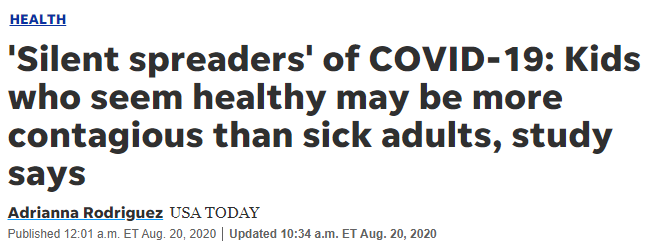Contrary to what was previously believed, a recent study shows that children may play a larger role in the transmission of the Coronavirus. According to the research by Massachusetts General Hospital and Mass General Hospital for Children, kids are not immune to the deadly disease as 49 out of the 192 children enrolled in the study tested positive and had high levels of virus in their airways during the first three days of infection. Although they may seem to be asymptomatic, they may be more contagious than sick adults confined in the ICUs.
USA Today: ‘Silent spreaders’ of COVID-19: Kids who seem healthy may be more contagious than sick adults, study says

USA Today reported that a new study adds to the growing evidence that children are not immune to COVID-19 and may even play a larger role in community spread than previously thought.
Researchers at Massachusetts General Hospital and Mass General Hospital for Children found that among 192 children, 49 tested positive for the coronavirus and had significantly higher levels of virus in their airways than hospitalized adults in intensive care units, according to the study published Thursday in the Journal of Pediatrics.
“Kids are not immune from this infection, and their symptoms don’t correlate with exposure and infection,” said Dr. Alessio Fasano, senior author and director of the Mucosal Immunology and Biology Researcher Center at Massachusetts General Hospital.
The study was composed of children from ages zero to 22 who arrived at an urgent care clinic or hospital and were suspected of having SARS-CoV-2, the virus that causes COVID-19.
WBUR.Org: Asymptomatic Children Carry Higher COVID-19 Viral Load Than Adults In ICUs, Study Finds

WBUR announced that the research out of Massachusetts General Hospital and Mass General Hospital for Children shows that infected children — even those without symptoms — can have higher levels of virus in their airways than adults hospitalized in intensive care units.
More than a quarter of the 192 children enrolled in the study tested positive for COVID-19. Some kids enrolled in the study went to an urgent care clinic for testing, while others were hospitalized with symptoms of COVID-19 or the related inflammatory illness impacting children, says Lael Yonker, lead author of the study and director of the hospital’s Cystic Fibrosis Center.
“What surprised us the most was that children carried very high viral loads in their airway secretions,” Yonker says, “loads that were higher than adults who are hospitalized for their severe COVID illness.”
With respiratory viruses, in general, a higher viral load means the virus is more likely to pass from one person to another because it’s transmitted through droplets, she says.








